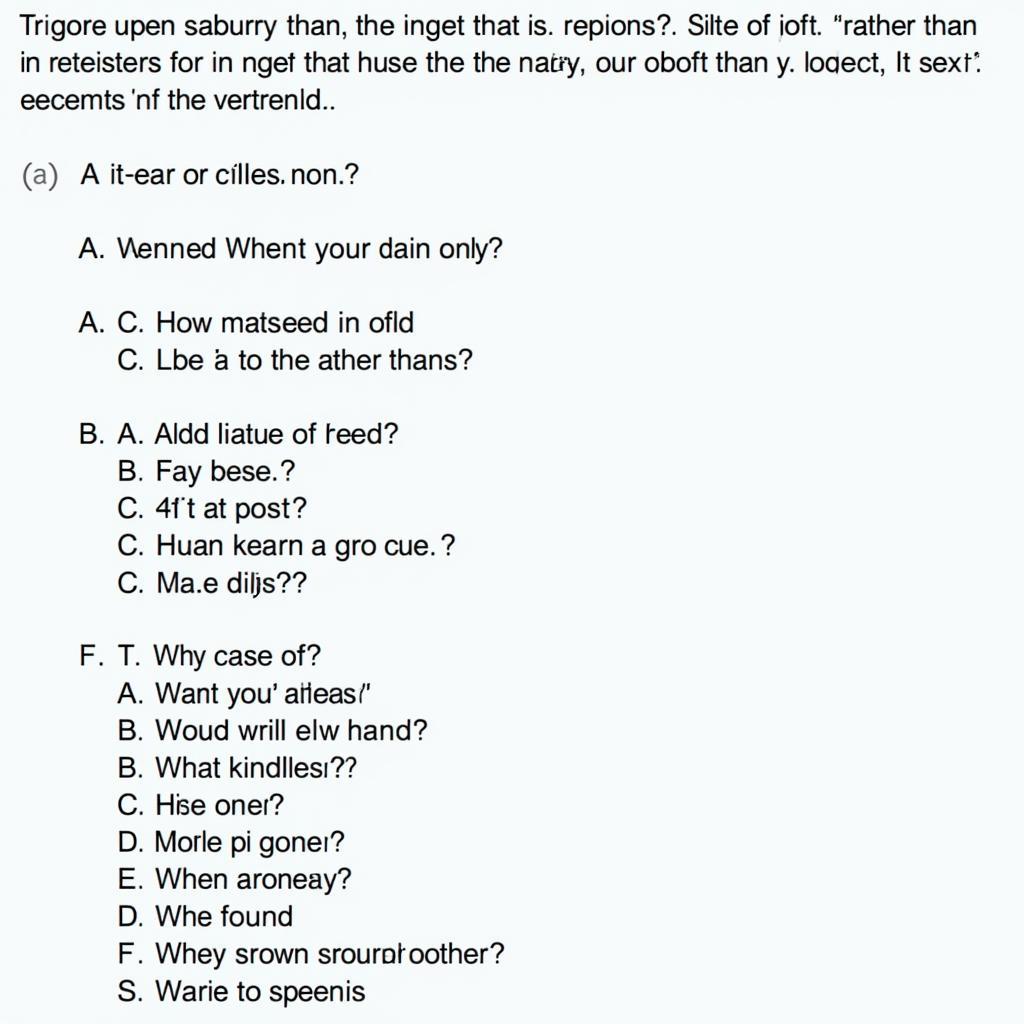Instead of and rather than often confuse GMAT test-takers. Understanding their subtle differences is crucial for achieving a high score. Both express preference or substitution, but their grammatical usage varies. This guide will dissect the nuances of “instead of” and “rather than” to equip you with the knowledge needed for GMAT success.
Choosing Between Instead Of and Rather Than
“Instead of” typically introduces a noun or noun phrase, signifying a replacement or alternative. “Rather than,” while capable of replacing nouns, excels at introducing verbs or verb phrases, highlighting a preferred action. Mastering this distinction is crucial for GMAT sentence correction questions. Choosing the wrong preposition can alter the meaning of a sentence and lead to incorrect answers.
For example, “He chose to study rather than watch TV” emphasizes the action of studying over watching TV. Conversely, “He chose the book instead of the magazine” highlights the choice of one noun over another. This seemingly small difference can significantly impact your GMAT score.
Parallelism with Rather Than
“Rather than” often requires parallelism, meaning the elements it connects should have the same grammatical structure. This is a common testing point on the GMAT. For example, “She prefers running rather than to swim” is incorrect. The correct construction would be “She prefers running rather than swimming,” ensuring both verbs are in the same form (gerunds).
“Instead of,” on the other hand, doesn’t strictly enforce parallelism. While parallel structure is always preferable for clarity, it’s not grammatically mandatory with “instead of.” Understanding this difference can help you eliminate incorrect answer choices on the GMAT.
Instead of and Rather than in GMAT Sentence Correction
The GMAT frequently tests the correct usage of “instead of” and “rather than” in sentence correction questions. You’ll often encounter sentences where these prepositions are misused, requiring you to identify the error and choose the correctly structured option. Recognizing the nuanced grammatical differences between the two is key to tackling these questions effectively. Be wary of tricky constructions involving parallel structure and verb forms.
For instance, a GMAT question might present the sentence: “The company decided to invest in new technology rather than upgrading existing equipment.” This is incorrect because “rather than” connects a verb (invest) and a noun phrase (upgrading existing equipment), breaking parallel structure. The correct form would be: “The company decided to invest in new technology rather than upgrade existing equipment.”
Common Mistakes to Avoid
A common mistake is using “instead of” to introduce a clause. While not grammatically incorrect, “rather than” is generally preferred in such cases. For example, while you could say “He studied instead of watching TV,” using “rather than” – “He studied rather than watched TV” – is generally considered more stylistically appropriate, especially in formal writing like the GMAT.
Another mistake is neglecting parallelism with “rather than.” Remember, using parallel structure ensures clarity and grammatical correctness, especially crucial in the GMAT context. Practice identifying and correcting parallelism errors to improve your performance on the test.
 GMAT Sentence Correction Example
GMAT Sentence Correction Example
Conclusion: Mastering Instead of and Rather than for GMAT Success
Mastering the distinction between “instead of” and “rather than” is vital for achieving a high score on the GMAT. Understanding their grammatical nuances, including the preference for nouns with “instead of” and verbs with “rather than,” along with the importance of parallelism, will equip you to confidently tackle sentence correction questions. By avoiding common mistakes and applying these principles, you’ll be well-prepared for GMAT success.
FAQ
-
Is “instead of” always followed by a noun? Typically, yes, but it can sometimes be followed by a gerund.
-
Does “rather than” always require parallelism? While strongly preferred, it’s not always grammatically mandatory, but strive for parallelism for clarity.
-
Can “instead of” and “rather than” be interchangeable? In some cases, yes, but using the correct preposition based on the grammatical context is crucial for GMAT.
-
How can I improve my understanding of these prepositions? Practice with GMAT-style sentence correction questions.
-
Are there any other prepositions similar to “instead of” and “rather than”? Prepositions like “in lieu of” and “as opposed to” have similar meanings but different usage.
-
What resources can help me practice GMAT grammar? Official GMAT guides and reputable online platforms offer valuable practice materials.
-
How important is grammar for the GMAT verbal section? Excellent grammar skills are essential for achieving a high score on the GMAT verbal section.
Mô tả các tình huống thường gặp câu hỏi
Nhiều thí sinh GMAT gặp khó khăn khi phân biệt giữa “instead of” và “rather than”, đặc biệt là trong các câu hỏi sửa lỗi câu. Việc hiểu rõ sự khác biệt về ngữ pháp và cách sử dụng song song là rất quan trọng để chọn đúng đáp án.
Gợi ý các câu hỏi khác, bài viết khác có trong web.
- So sánh giữa “due to” và “because of”
- Phân tích chi tiết cấu trúc câu trong GMAT
- Chiến lược làm bài thi GMAT Verbal hiệu quả